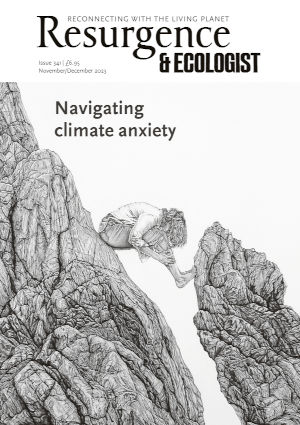The climate crisis is a tangible reality, but collective fear, ignorance and denial will only get in the way of much-needed action. This is what climate activist Mikaela Loach lays out in her new book It’s Not That Radical: Climate Action to Transform Our World. “It is a book about active hope; about all that is possible once we let go of the baggage of the old world and have the bravery to step into – and build – a new one,” she writes.
The text positions itself as an introduction to climate justice, but it may also prove useful to those familiar with the topic, as it’s packed with insightful case studies. It’s Not That Radical covers everything from who is responsible for the climate crisis to how it intersects with other societal oppressions such as racism and classism, as well as the fossil fuel industry’s attempts to thwart climate action. Loach also delves into the more personal side of her journey within activism, touching on representation politics, perfectionism and individualism. Her grandmother, who has many wise anecdotes, occasionally features too.
By explaining how she has arrived at her current political positions, Loach remains vulnerable to her readers, reminding them that all anyone can do is their best at any given time. At the tender age of 18, Loach was judged for her evolving views at a university party, leaving her feeling ashamed. After this unpleasant encounter – or, as she calls it, “rejection” – by someone she saw as her peer, she had to work hard to overcome the limiting idea that people shouldn’t engage with complex topics they don’t fully understand. “We have to move beyond the narrative that you can’t do anything about a particular issue because you don’t know enough, or the idea that ‘smarter people’ than you have it covered,” she writes.
Another struggle Loach experienced in her early days of organising was seeing the world in black and white and subconsciously labelling people ‘good’ or ‘bad’ based on a few opinions they hold. Nowadays, she tries to ‘see no stranger’, which means treating everyone as you would treat someone you know. “[Seeing no stranger] has helped me not to harden myself to the world completely yet. I think soft hearts are so important. We need soft hearts that will break and move us into action.” In the face of growing climate-related inequality, injustice and conflict, Loach actively chooses to see more good than bad in the world. This is her most radical quality.
Loach argues that the climate crisis is an opportunity for social justice and climate action to intersect and create a fairer world for everyone. Her worldview has been shaped by feminists such as Audre Lorde, bell hooks, Naomi Klein, Emma Dabiri and adrienne maree brown. “When we tackle the climate crisis through a justice lens, we are not just making the same world but ‘green’,” she writes. Loach’s anti-capitalist stance rejects the idea of ‘green capitalism’ – using free-market solutions to mitigate climate change – because she sees capitalism and the inequality and waste it leaves behind as being the root of the climate crisis. The global environmental emergency is not just about emissions, but about how entire communities have been exploited and left vulnerable, such as those in the Niger Delta and in Jamaica’s Cockpit Country.
Loach is not naive. She knows that tackling the climate crisis requires a tremendous amount of work, but she also looks to historical examples of successful coalitions such as Lesbians and Gays Support the Miners for organisational and political inspiration. In the UK, some of this coalition-building is already under way by the groups coming together to act for people and the planet. Earlier this year, an estimated 100,000 people gathered for Extinction Rebellion’s ‘Big One’ protest, and half a million people went on strike for better working conditions. In Loach’s eyes, these events are all interlinked and are foundational to the future of a just climate movement.
It’s Not That Radical: Climate Action to Transform Our World by Mikaela Loach. DK, 2023. ISBN: 9780241597538.







